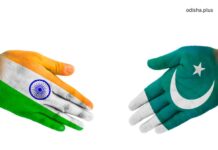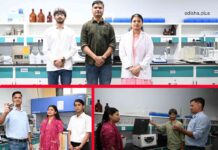Kailash Chandra Dash
Here is a respectful homage to Professor Sriram Chandra Dash on the conclusion of his birth centenary on 17th November 2019.

I still remember the day of December 1975 during the darkened phase of Emergency when Professor Dash was given compulsory retirement from his post in the Department of Political Science of UtkalUniversity. He was born on November 17, 1918, in Beera Narasimhapur Sasan of the present Jagatsinghpur district. We have an interesting and authentic report on his life and mission in his autobiography entitled Mo Akuha Kahani(My Untold Story) which was first published in 1992. He got early education from Balikuda Middle English School from 1928 to 1931 and there he was influenced by the Civil Disobedience Movement of Mahatma Gandhi. Then he also read Odia newspapers like The Asha and Satya Samachar.
He came in contact with PranakrushnaParija who was once a student of that school and RadhaCharan Panda and this contact was helpful to him. He got stipend after having passed the ME exam and entered into Ravenshaw Collegiate School in 1932 as a student of Class VIII. He also stood first in the Entrance Examination in 1935. During his school days due to the wrong diagnosis, he was declared as a leprosy patient and this declaration by a doctor named Rajkishore Nanda affected his education and consequently, he had great suffering. Soon the situation was favorable for him and in 1936 he started his study in IA Class in Ravenshaw College Cuttack.
While a student he wrote his first essay entitled Delhi Jatra in 1939 in an important Odia monthly NabaBharata edited by Nilakantha Das. This article published in two parts describes his participation in the All India Debate Competition organized by Anglo-Arabic College(later JamiaMilia) of Delhi. He came in contact with Subhas Chandra Bose and participated in the Students conference at Cuttack. But as he was then a career-oriented student he could not like to participate in the Ravenshaw College Students` Strike in 1939 for which some student leaders became his enemies.

We have an interesting report on his views on the strikes in 1939-40 which was furnished by the colonial officers in 1940. According to that report students` meeting was held in the Tenis Ground of Ravenshaw College Compound on 20th February 1940 under the presidentship of BanamaliMohanty, president of the Ravenshaw College Union with an audience of about 150. In that meeting, Girija Shankar Bohidar moved a resolution condemning the action of the Syndicate congratulating the two students for being punished by the authorities on a national cause and exhorting the students of the Ravenshaw College to support the student’s cause. This was seconded by Surajmal Saha.
At that crucial hour, Sriram Chandra who was an examinee began to oppose the resolution. An attempt was made to shout him down. Heedless to all cheerings and jeerings he went on condemning the speakers like Nilamani Routray and Bibhudendra Mishra. He was not allowed to speak more. Ramakrushna Pati and some other students surrounded him and assaulted him. He was escorted to the hostel by some of his well-wishers. This action of some of the students was criticized by a section of the audience who demanded that Sriram should again be invited and be allowed to have his views in the meeting.
Accordingly, Gangadhar Mahapatra and Sachi Routray called Sriram back from the hostel and requested him to speak again. Sriram said that his previous speakers were fantastic in their ideas. They wanted to turn this great institution to ruins. They had advised students to boycott the University examination. But had they made any arrangements for the poor students? In case these poor students joined the strike and in case the strike failed they would not be in a position to continue their studies for another year. Would the agitators give an undertaking that if such untoward things happened they would provide for the boarding lodging and other expenses of these poor students for one year more? He was sure that these agitators would not give such an undertaking. At that stage, there was too much opposition and he was hardly heard. He was not allowed to speak any further. Sriram was also criticized by the student leaders like Ashok Das and Durga Charan Mohanty. Even Harekrushna Mahatab became his great enemy for years for this attitude.
In his graduation stage, he had Economics honors and History (Pass) and he was well appreciated by his teachers like Nishikant Sanyal, Ghanashyam Das, Nirmal Banerjee, Suresh Chandra Bardhan, Narayan Mohan De, Artta Ballabh Mohanty, Bipin Bihari Ray and Ratnakar Pati. In 1940 he went to Patna College for his post-graduate course in Economics as in Ravenshaw College there was no MA class in Economics then. In Patna, he was associated with Young Men`s Association(Debate branch) and there his eloquence as a speaker in English was widely appreciated. He was the president of the Chanakya Society which was an Economic Association. After the completion of his MA course in Patna in 1942, he came to Cuttack and worked at Nababharat office for some months and then he was posted as an Inspector Accountant in the Income Tax Department. Later in 1943 he was posted as Supply Supervisor and continued till 1945 when he was posted as a lecturer in Economics at Ravenshaw College. He was transferrred from Cuttack to Puri, Balasore, and Jeypore due to the pressure of Mahatab who even ordered his dismissal from service. But it was cancelled by Nabakrushna Chaudhury in 1951.
Late in the 1950s, Mahatab had a deep appreciation for his scholarship and he even asked Sriram to write essays in Jhankara(Odia monthly magazine). He came to Ravenshaw College again in 1952 but he got permission for higher study and research and went to the Free University of West Germany in December 1953. He remained there for 16 months and completed his Doctorate on the Constitution of India: A Comparative Study and found four months from September to December of 1954 to visit some European countries. Even he also participated in the International University Teachers Conference held at Vienna on 10th September 1954.
Sriram Dash came back to India and was posted at Ravenshaw College in 1955. While he was in Ravenshaw in 1958 Political Science as a separate subject in Hons and Pass was opened and for that, he had a great contribution. In 1962 he was posted as Reader in Political Science and joined Utkal University in 1963. While he was in Ravenshaw he had passed Law in first class as a private student in 1961.
Dr Dash was the president of the All India Political Science Association in 1970 and 1972. He was the General Secretary of that Association in Pune in 1957. In 1966 on 28th January there was a Youth leadership training Camp in the Department of Political Science organized by UGC and Utkaluniversity. Professor Dash used that occasion which was largely attended by the Political Science teachers and arranged on 30th January the first All Odisha Political Science Conference which was a grand success. Dr. Dash had several testing phases in his life. But he was fearless to face the adverse situation. When he lost his job in 1975 he entered into the legal profession and had great fame in that line also.
He was an eloquent speaker and a powerful writer. About 5000 articles were published by him in different journals, magazines, and newspapers. He had powerful essays in Sahakara from 1941, in Nababharata from 1939, Satyabadi New, Dagar and Jhankara from 1952. His books in English include The Consitution of India:A Comparative Study(1968), Gopabandhu Das(1976), Orissa(1970), Gopabandhu:A Biography(1964), Problems of Higher Education(1976), Constitutional and Political Dynamics of India(2004), Comparison of the Fundamental Lectures of the Constitution of India with those of the United States, Weimar Germany and West German Federal Republic(1954), States of our Union:Orissa(1978). His autobiography Mo AkuhaKahani is a lasting contribution to Odisha’s studies.
His book entitled Europare Mo Anubhuti(My Europe Journey) was also famous and for this, he got OdishaSahitya Academy Award. His first book in Odia was Mo Desha published in 1948 which presented the administrative history of India from 1765 to 1947. His outstanding novel was Real Romance. Though he was deserted and ignored in the Governmental sphere he was well appreciated in cultural activities. His numerous essays need to be compiled into volumes. He was a remarkable figure of India in his days.



























